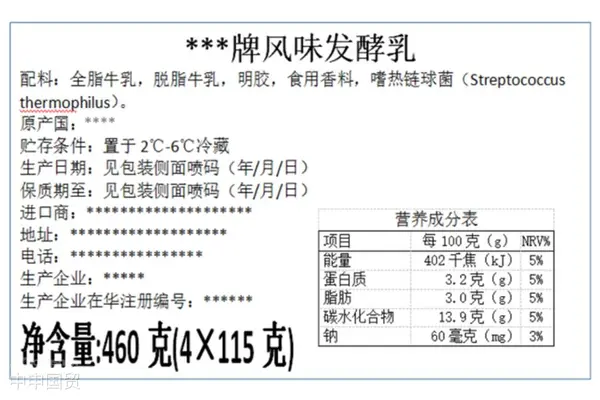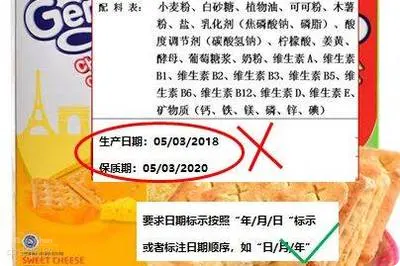- Shanghai Zhongshen International Trade Co., Ltd. - Two decades of trade agency expertise.
- Service Hotline: 139 1787 2118
August 19, 2024 13:15

In international trade, the accuracy of labels of imported pre - packaged foods not only affects consumers choices but also relates to the legal and compliant operation of enterprises. With increasing attention to food safety issues, how to ensure that the label markings of imported foods comply with relevant laws, regulations, and national standards in our country has become an important issue that cannot be ignored.
III. How to Standardize the Label Markings of Imported Pre - packaged Foods?
According to laws and regulations such as the Food Safety Law of the Peoples Republic of China and the General Standard for Labels of Pre - packaged Foods (GB 7718 - 2011), the labels of imported pre - packaged foods should meet a series of basic requirements. These requirements not only include the use of standard Chinese characters and true and accurate descriptions, but also cover mandatory marking contents such as food name, ingredient list, net content and specifications, importer information, country of origin, production date, and shelf - life. Any inaccuracy or non - standardization of the label may trigger legal risks and consumer misunderstandings.

I. Basic Requirements for Labels of Imported Pre - packaged Foods
However, in actual operation, there are many common problems with the labels of imported pre - packaged foods. For example, the food name is not clearly marked, the marking of food additives in the ingredient list does not conform to the international coding, the unit of measurement of the net content is wrong, and the date marking does not conform to the specified order. These problems not only affect the sales of food but may also lead to penalties from regulatory authorities.
The root cause of errors in labels of imported pre - packaged foods often lies in enterprises unfamiliarity or insufficient understanding of relevant laws, regulations, and standards. Due to the wide variety of imported foods and complex standards, especially for composite foods with multiple ingredients, label errors are particularly common. These errors may not only trigger consumer complaints but also lead to the removal of foods from the market and even involve legal disputes.
For example, some products do not mark the net content as required, or use non - legal units of measurement incorrectly. This not only violates the law but also misleads consumers. In addition, the lack of the name, address, and contact information of the importer or distributor on the label is also a common compliance issue. These seemingly minor errors may hinder the circulation of food in actual operation and affect the reputation and market share of enterprises.?
III. How to Standardize the Label Markings of Imported Pre - packaged Foods
In order to reduce errors in the label markings of imported pre - packaged foods, enterprises should take a series of measures:import and exportStrengthen the study of laws, regulations, and standards:
Enterprises must be familiar with and accurately understand relevant standards such as GB 7718 - 2011 to ensure that all label marking contents meet the requirements. For some complex or unclear situations, professional institutions can be consulted or legal reviews can be carried out to ensure the accuracy of the label.Improve the internal review process:
Before importing and selling food, establish a strict label review mechanism to ensure that each marking content is reviewed by a professional team. This includes checking whether the food name accurately reflects the product attributes, whether the ingredient list is clearly marked, and whether the unit of measurement of the net content is correct.With the changes in laws, regulations and market demands, enterprises should regularly update and review the label content to ensure that the label markings comply with the latest national standards and regulatory requirements.
Conclusion
The labels of imported prepackaged foods are not only an important way for consumers to obtain product information, but also a key link in ensuring food safety and compliant operation. By deeply understanding and strictly implementing relevant regulations, enterprises can effectively reduce the risk of label errors, enhance the market competitiveness of products, and protect the rights and interests of consumers. Standardized label markings are not only a legal requirement, but also the cornerstone of corporate reputation and market success.
. For more relevant information and content, welcome to followImported prepackaged food labels: Why is accurate labeling crucial?.ZhongShen International TradeAs a one - stop importExport RepresentationService providers can provide customized import and export solutions for various industries. If you needforeign tradeFor import and export agency services, please feel free to contact our company for business inquiries. The consultation hotline is 139 - 1787 - 2118.
Related Recommendations
Category case
Contact Us
Email: service@sh-zhongshen.com
Related Recommendations
Contact via WeChat

? 2025. All Rights Reserved. 滬ICP備2023007705號-2  PSB Record: Shanghai No.31011502009912
PSB Record: Shanghai No.31011502009912









